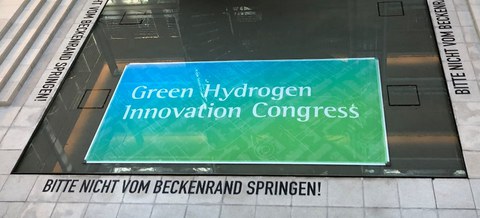Research
Research at the professorship contributes to the Sociology of Technology and Science, Environmental Sociology, Micro-Sociology, as well as Science and Technology Studies (STS). We analyze, e.g., how lay people and experts use data and technology, how they cooperate to transform infrastructures (of traffic, information, and energy), and what it means to be "sustainable" or become "green."
Table of contents
Publications by the professorship
2025
-
Widerhall und Widerspruch: Zur Verknüpfung ökologischer, ökonomischer und feministischer Auseinandersetzungen bei Mary Mellor und Anna Lowenhaupt Tsing, Oct 2025, In: Freiburger Zeitschrift für GeschlechterStudien : FZG. 31, 1, p. 49-64Electronic (full-text) versionResearch output: Contribution to journal > Research article
-
Domestic Discords: Frictions in Smart Speaker Valuation, Jan 2025, In: Digital culture & society. 9, 2, p. 207-226, 20 p.Electronic (full-text) versionResearch output: Contribution to journal > Research article
2024
-
„Da drück ich dann aufs Mikro, wenn’s hier mal um Dinge geht…“: Kreative Privatisierung. Der Umgang mit Privatheitsansprüchen in der Smart Speaker-Nutzung. , Oct 2024, Data Sharing – Datenkapitalismus by Default?. Friedewald, M., Roßnagel, A., Geminn, C., Karaboga, M. & Schindler, S. (eds.). Nomos-Verlagsgesellschaft, p. 215-242, 28 p.Electronic (full-text) versionResearch output: Contribution to book/conference proceedings/anthology/report > Chapter in book/Anthology/Report
-
Valuing Data: Attaching online data to stakes, selves, and other data, 2 May 2024, In: Valuation Studies. 11, 1, p. 60-90, 31 p.Electronic (full-text) versionResearch output: Contribution to journal > Research article
-
Evaluation of Sustainability in Basic Research - Insights from an interdisciplinary research initiative, 2024, 15 p.Electronic (full-text) versionResearch output: Preprint/documentation/report > Working paper
-
Kunst- und Kulturinstitutionen in der polarisierten Stadt: Projekteinblicke, 2024, Kulturproduktion in der Migrationsgesellschaft: Herausforderungen für Kulturinstitutionen und Kulturpolitik. Schneider, J., Oltmer, J., Pott, A. & Schmiz, A. (eds.). transcript Verl, p. 141-154Electronic (full-text) versionResearch output: Contribution to book/conference proceedings/anthology/report > Chapter in book/Anthology/Report
-
Mobility as a Resource (MaaR) for resilient human-centric automation - a vision paper, 2024, In: Data Science for Transportation. 7, 1, p. 3-11, 8 p., 1Electronic (full-text) versionResearch output: Contribution to journal > Research article
2023
-
Situating machine learning: On the calibration of problems in practice, 25 Feb 2023, In: Distinktion : scandinavian journal of social theory. 24, 2, p. 315-337, 23 p.Electronic (full-text) versionResearch output: Contribution to journal > Research article
-
Die produktive Kraft der Polarisierung und ihre Auswirkungen auf Kunst und Kultur, 2023, Konfliktuelle Kulturpolitik. Schad-Spindler, A., Landau-Donelly, F., Fridrik, S. & Marchardt, O. (eds.). Wiesbaden: Springer VS/Springer Fachmedien, p. 113-135Research output: Contribution to book/conference proceedings/anthology/report > Chapter in book/Anthology/Report
-
Heim TÜV 4.: Die Unterbringungssituation in Sachsens Aufnahmeeinrichtungen, 2023, Der Sächsische Ausländerbeauftragte Research output: Preprint/documentation/report > Project report (Final and progress reports)
You find our funded research projects below:
Responsible Electronics in the Climate-Change Era (REC2)
Excellence Cluster, Speaker: Prof. Dr. Yana Vaynzof
Duration: 01.01.2026 - 31.12.2032
Funding: DFG
Infrastrukturelle Disuption? Energiewende und Wasserstoffversorgung in soziologischer Perspektive (InDis)
InDis studies the development of a hydrogen infrastructure in Saxony. The aim of the project is to develop an empirically based understanding of the coordinative dynamics associated with profound infrastructural changes in industrial energy supply. As efforts to implement a CO2-neutral hydrogen circular economy, the restructuring of infrastructures poses complex problems of cooperation and coordination. The project analyses how these problems, and their solutions, are attended to: Which logics or conventions are recurred upon in these negotiations and which strategic actors are involved in them, and how? Subject to negotiation is both the integration of technological innovations into existing infrastructure—as well as the justification of efforts, costs, and changes that infrastructural reconstruction entails. The project examines how the disruptive potential inherent in infrastructural restructuring is negotiated and, if necessary, contained. With the Saxon hydrogen economy (in its national and international interconnectedness) as its case, the project relies upon multi-sited ethnography, expert interviews, and practice transfer workshops.
- Duration: 42 months (01.07.2022-31.12.2025)
- Principal investigator: Jun.-Prof. Susann Wagenknecht, PhD (sole PI)
- The project is associated with the TUD research initiative on “Disruption and Societal Change” (TUDiSC) and (in preparation) with the Centre for Sustainability Assessment and Policy (PRISMA, contact: Prof. Dr. Edeltraud Günther, TUD/UNU-FLORES).
- more information
Disruptions of networked privacy (DIPCY)
DIPCY investigates disruptions of privacy in the Internet of Things. The project aims to conceptually research on disruptions and disruptive changes both conceptually and empirically. The project focuses on privacy infringements involving third parties—infringements, we argue, that harbour a particularly high potential for disruption as they affect, disturb, or even destroy existing orders of privacy. Taking its cue from current privacy research, the project pursues a context-sensitive, relational, interdisciplinary, and methodologically plural approach. It combines sociological, communication, media and technology perspectives on privacy with cutting-edge research in computer science. Project partners interweave and complement subject-specific expertise by means of three studies, i.e., (1) an ethnographic situation analysis, (2) a semi-automatic content analysis, and (3) the development and evaluation of prototypes.
- Duration: 48 months (01.09.2021-31.08.2025)
- Principal investigators: JProf. Susann Wagenknecht, PhD, Dr. Johanna E. Möller (Communication Science, TUD), Dr. Stefan Köpsell (Privacy and Security, Computer Science, TUD), Prof. Dr. Sven Engesser (Communication Science, TUD)
- Project staff, as of October 2022: Lukas Schmitz (work package 1/Wagenknecht), Katrin Etzrodt (work package 2), Stephan Escher (work package 3)
- Note: The project is funded by the TUD excellence measure “Disruption and Societal Change” (TUDiSC, contact: Dr. Karoline Oehme-Jüngling,
https://tu-dresden.de/gsw/forschung/exzellenzmassnahmen/tudisc).
More details on the DIPCY-Website

